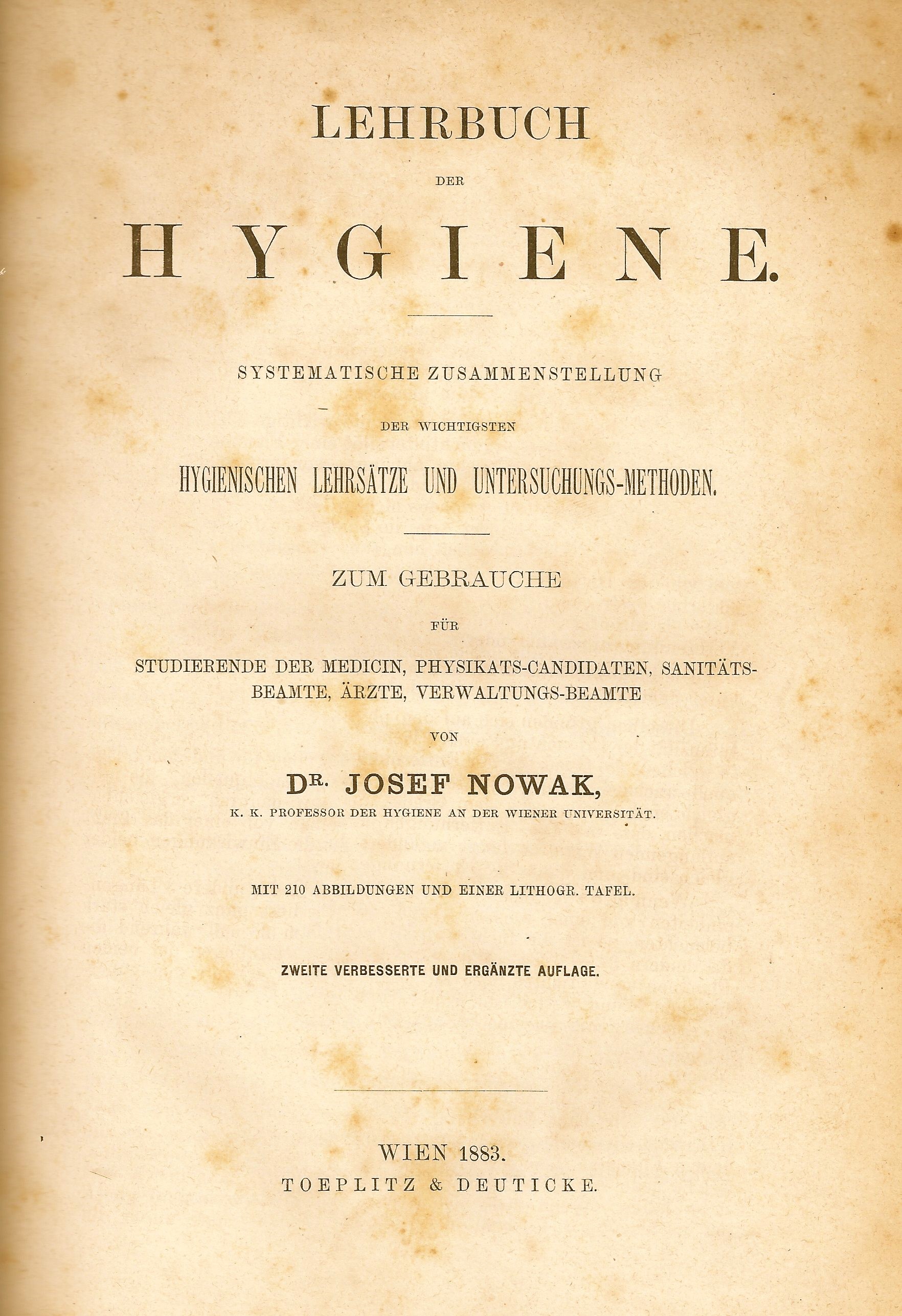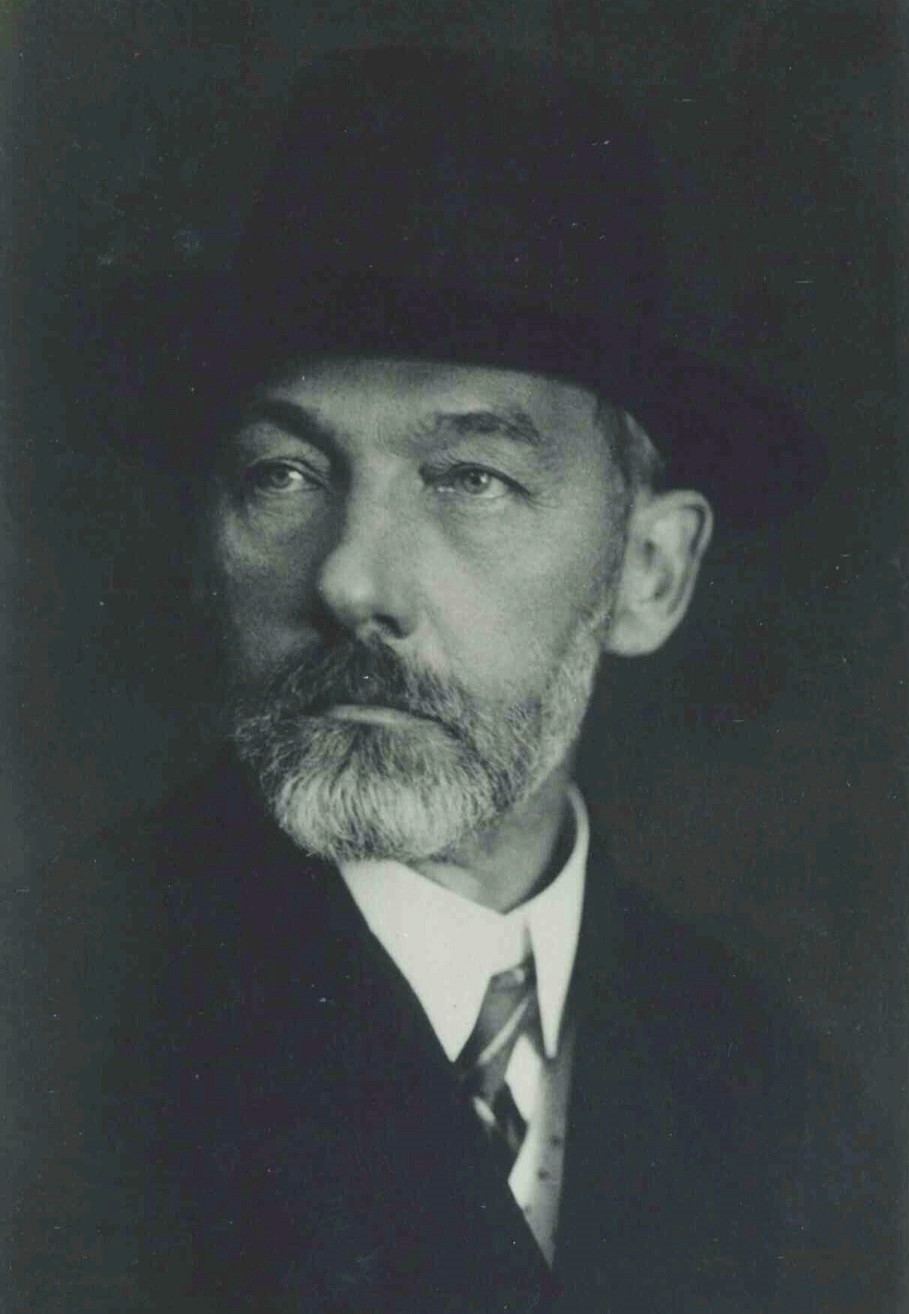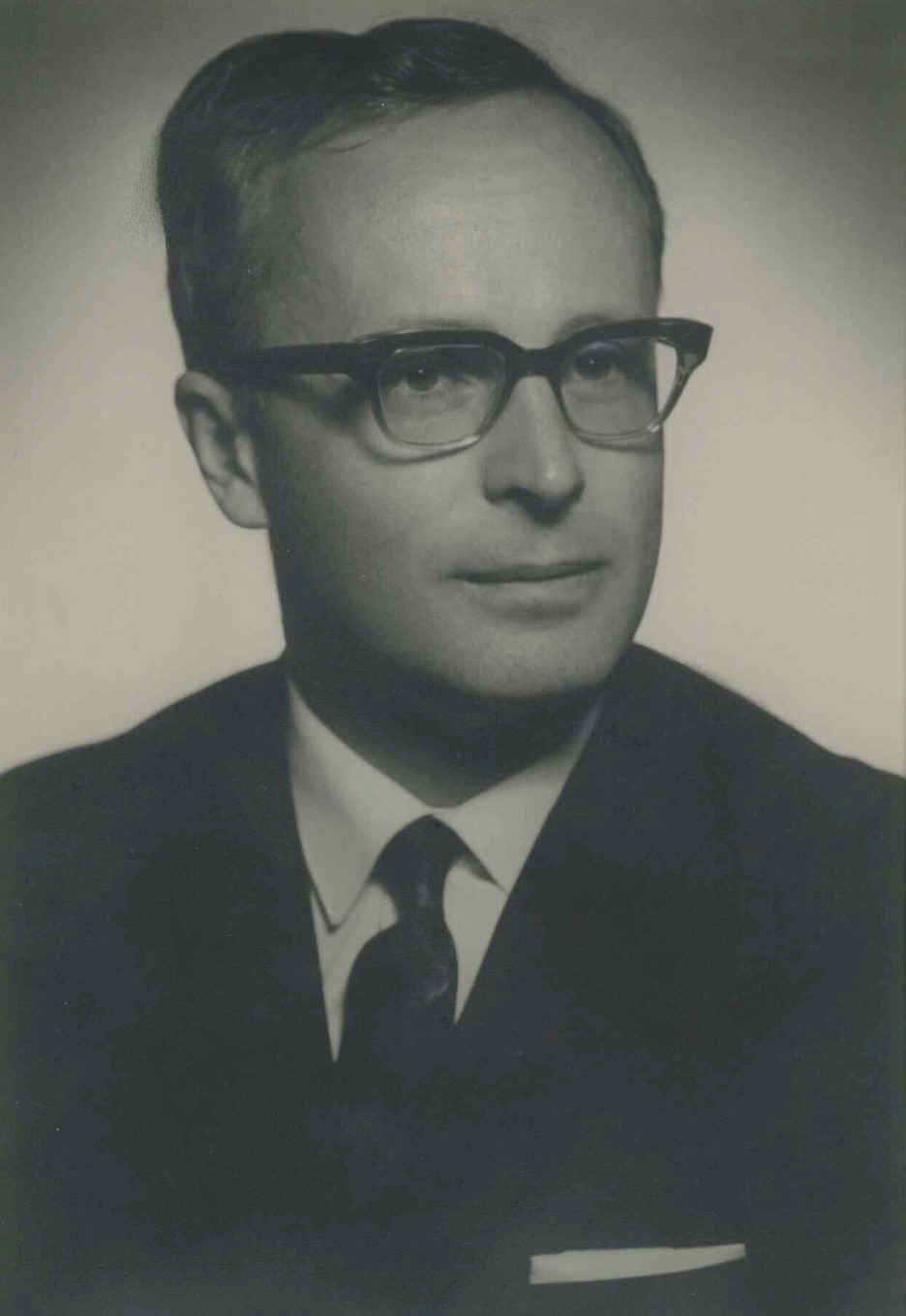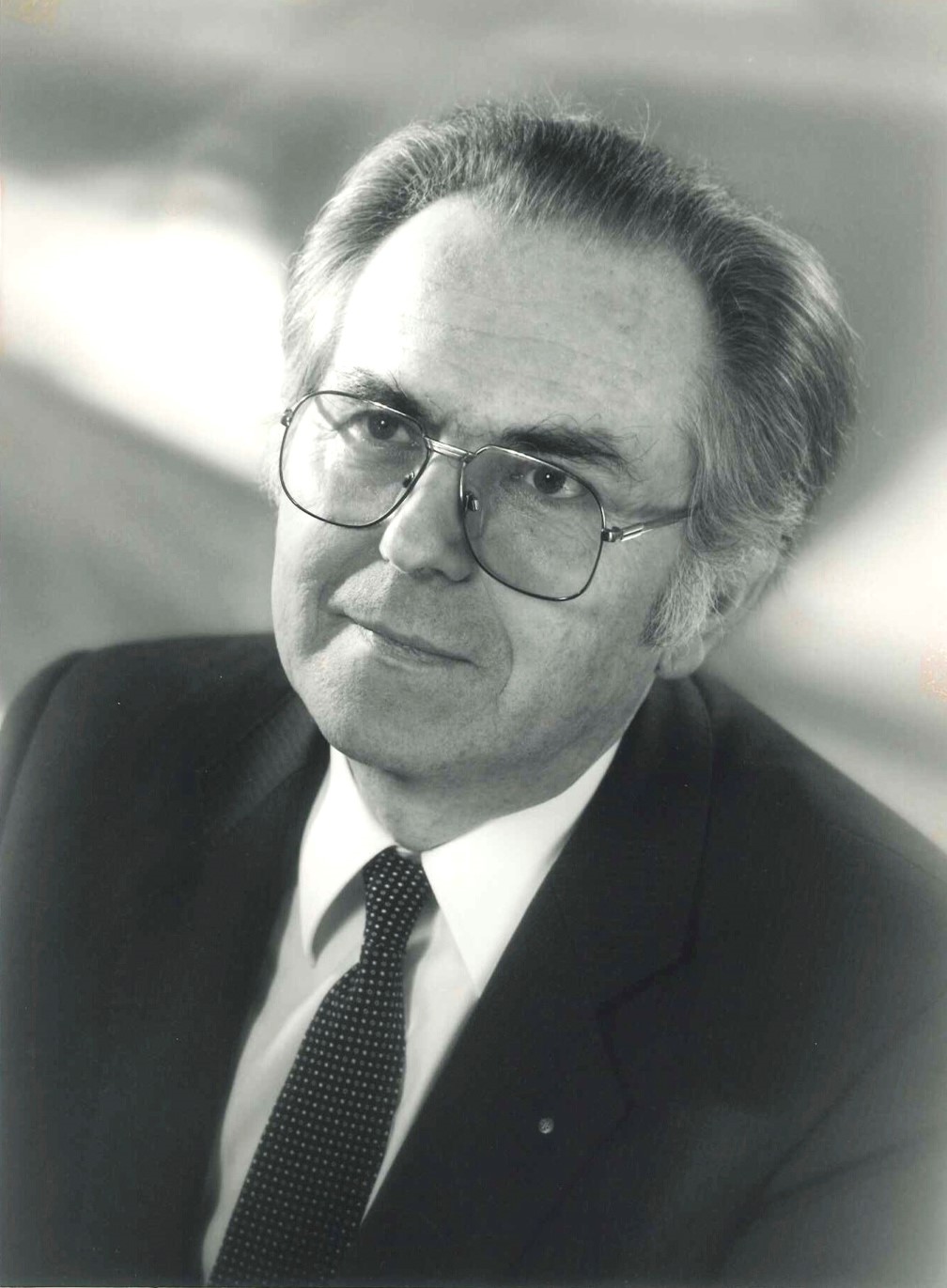Josef Nowak (1841–1886)

Josef Nowak was born on November 1, 1841, in Trautenau in Bohemia (now known as Trutnov, Czech Republic), and passed away on March 26, 1886, in Smichow (now Smichov, CR), near Prague. He attained his doctorate in Medicine on March 10, 1866, from the Josephs-Akademie. From 1871 onwards, he served as the acting head of the Department of Pathological Chemistry at the Josephs-Akademie, holding the position of Staff Physician II. Class. In 1873, he achieved habilitation for Forensic and Hygienic Chemistry at the University of Vienna. On May 24, 1875, Nowak was appointed as an extraordinary professor to the newly established Chair of Hygiene. Despite not having his own institute, he continued his work in the chemical laboratory of the Military Medical Committee.
In 1881, he relocated to four modestly furnished rooms in the nearby old gun factory at Schwarzspanierstraße 17. Nowak's profound understanding of hygiene is evident in his textbook "Systematische Zusammenstellung der wichtigsten hygienischen Lehrsätze und Untersuchungs-Methoden" (Systematic Compilation of the Most Important Hygienic Theorems and Examination Methods). After its initial editions in 1881 and 1883, the textbook was further developed and expanded through eight additional editions until 1908 under the editorship of the Munich hygienist Max Rubner, solidifying its status as a leading textbook in the field of hygiene. Nowak's notable achievement lies in his establishment of hygiene as a fundamental discipline in university education.
Max Gruber (1853–1927)

Max Gruber was born on July 6, 1853, in Vienna, and was ennobled as Ritter von Gruber in 1908. He passed away on September 16, 1927, in Berchtesgaden. He pursued studies in Medicine, obtaining his doctorate in April 1876, and Chemistry at the University of Vienna. From 1879 to 1882, he underwent training in Physiological Chemistry in Munich. In August 1882, he achieved habilitation for Hygiene at the Medical Faculty in Vienna. Gruber was appointed to the new extraordinary chair of hygiene at the University of Graz on April 3, 1884, and to a similar position in Vienna on March 23, 1887, which was upgraded to a full professorship on October 12, 1891. The latter was housed inadequately in rooms of the former gun factory at Schwarzspanierstraße 17. Nevertheless, he conducted significant research in various areas of hygiene, including water, commercial, factory, housing, food, and racial hygiene. Within the realm of infection and hygiene, he discovered the agglutination reaction. Although Gruber planned a new institute building, he accepted an appointment to the Hygienic Institute in Munich in 1902, where he remained until 1923. Alongside Rubner and Ficker, Gruber edited the textbook "Handbuch der Hygiene," and he served as the first secretary of the "Archiv für Hygiene," established in 1883. His name is immortalized through the "Grubersche Reaktion," which revolutionized the serological differentiation of bacteria.
Arthur Schattenfroh (1869–1923)

Arthur Schattenfroh was born on October 27, 1869, in Salzburg, and passed away on October 12, 1923, in Vienna. He pursued medical studies in Graz, Strasbourg, and Vienna, obtaining his doctorate in 1893 in Graz. Following this, he engaged in various pursuits including work in chemistry in Vienna, Wiesbaden, and Heidelberg, as well as research on glanders and phagocytosis at the Department of Pathology of the Vienna Hospital Rudolfstifung and the Munich Institute for Hygiene. From May 1896, he served as an assistant to Max Gruber. In 1898, Schattenfroh achieved habilitation for hygiene. In 1902, he was appointed as an extraordinary professor ad personam and played a significant role in planning the new Institute for Hygiene. Following Gruber's departure, Schattenfroh assumed the role of interim director and, from October 31, 1905, served as a full professor and head of the Institute as well as the Food Safety Department. The inauguration of the new Institute building took place on October 23, 1908. Schattenfroh was deeply committed to public health care, and his notable achievement lies in the remarkably modern planning and realization of the Hygiene Institute and the Food Safety Department.
Roland Graßberger (1867–1956)

Roland Graßberger was born on November 26, 1867, in Salzburg, and passed away on December 4, 1956, in Vienna. He completed his medical studies in Vienna, obtaining his doctorate in 1892. After gaining experience in various hospital departments, he joined Max Gruber as a second assistant in October 1897. Graßberger achieved habilitation in 1902. From October 10, 1906, he held the position of extraordinary professor ad personam, and in 1917, he was awarded the title of full professor. In 1922, he assumed leadership of the new Department of Medical Officers (Physikatskandidaten) at the Institute. On October 1, 1924, he was appointed as the Head of the Institute. Throughout his career, Graßberger focused his work on disinfection, water and food hygiene, industrial hygiene, school hygiene, and mental hygiene. He made the groundbreaking discovery of satellite growth, in German Ammenphänomen. One of Graßberger's notable statements was: "Above all, you need courage to practice hygiene. To do it properly, you need another quality, which is modesty." This statement encapsulates his belief in the importance of both courage and humility in the pursuit of effective hygiene practices.
Max Eugling (1880–1950)

Max Eugling was born on January 1, 1880, in Feldkirch, Vorarlberg, and passed away on June 23, 1950, in Vienna. He pursued studies in Physics and Chemistry in Graz and Innsbruck, followed by Medicine, obtaining his doctorates in 1904 and 1907 respectively. He then served as an assistant to Schattenfroh. During the First World War, Eugling served as the commander of an epidemic laboratory and a Health Commission. He achieved habilitation in 1922, became an extraordinary professor in 1928, and was appointed as a full professor and head of the Vienna Institute for Hygiene in 1937. From 1925 to 1947, Eugling edited the textbook "Grundzüge der Hygiene" (Principles of Hygiene) through four editions. His research focused on water hygiene, disinfection, and sterilization, particularly in areas affected by malaria. Due to his activities during the Nazi regime, Eugling was not accepted back into active service in the newly founded Austria.
Marius Kaiser (1877–1969)

Marius Kaiser was a prominent figure in Austrian public health, renowned for his groundbreaking contributions in bacteriology and epidemiology. Born on September 9, 1877, in Friesach, Carinthia, he pursued his education in medicine in Graz, obtaining both his medical degree and doctorate. Kaiser's career trajectory saw him at the forefront of numerous pivotal moments in public health history. In 1903, he commenced his tenure at the Hygienic Institute, marking the genesis of his impactful journey. His service as an imperial-royal Marine medical officer in Trieste from 1908 was instrumental in averting the spread of cholera into Austria in 1911 through innovative bacteriological interventions, catalyzing the reorganization of the Marine Medical Service along the Austrian coast. Throughout World War I, Kaiser assumed critical roles, directing an epidemic laboratory and a health commission. His expertise and leadership were further recognized with a habilitation in 1918. By 1921, he was appointed epidemic consultant of the Vienna Public Health Office by the Ministry of Social Affairs, a testament to his growing influence in the field.
Kaiser's contributions extended into the interwar period and beyond. He assumed directorship of the Federal State Vaccine Extraction Institute in 1925, a position he held until 1950. During World War II, he served as an advisory hygienist for Military District XVII.
Post-war, Kaiser's dedication to public health remained unwavering. He transitioned into ministerial roles within the Public Health Office, overseeing vital institutions such as the Vaccine Extraction Institute and the Vaccination Institute for Rabies, among others. In August 1946, he ascended to the esteemed position of full professor and head of the Hygiene Institute at the University of Vienna. Kaiser's global impact was evident when he represented the Austrian Government by signing the Constitution of the WHO in New York on June 22, 1946. This significant moment underscored his commitment to international cooperation in combating public health challenges. Notably, Kaiser spearheaded the reconstruction of the institute's infrastructure post-war, showcasing his resilience and dedication to advancing scientific endeavors. His pioneering research on pox viruses and the development of vaccines, notably the prevention of post-vaccinal encephalitis, exemplified his scientific prowess. Beyond his professional achievements, Kaiser was deeply invested in ensuring the safety of Vienna's water supply, particularly from karst areas. Even after his retirement in 1948, he continued to serve as acting director of the institute until January 1952, leaving an indelible mark on the landscape of Austrian public health.
Richard Bieling (1888–1967)

Richard Bieling was a distinguished figure in the realm of public health, whose contributions spanned decades and disciplines. Born on September 3, 1888, in Gau-Algesheim, Rhineland, his journey encompassed a rich tapestry of educational pursuits and professional endeavors. Bieling embarked on his medical education from 1907 to 1912, traversing esteemed institutions in Munich, Berlin, and Freiburg im Breisgau. The crucible of the First World War propelled him into the sphere of military laboratories, where he made notable discoveries, including the seminal "anamnestic serum reaction." Post-war, Bieling's career trajectory saw him ascend to the position of department head at the Höchst Farbwerke, and by 1935, he assumed a similar role at the Behringwerke in Marburg. His expertise proved invaluable during the tumult of the Second World War, where he lent his insights as a consulting hygienist, particularly on matters concerning gas gangrene and tularemia. Subsequently, his tenure at the Behringwerke saw him spearhead endeavors in the production of immune sera and vaccines, while also delving into research on viruses and rickettsiae. In January 1952, Bieling assumed leadership of the Vienna Hygiene Institute, where he continued the institute's reconstruction and played a pivotal role in establishing departments tailored for cutting-edge research, notably in virology, bacteriology, water, and industrial hygiene. His guidance and counsel were instrumental to the leaders of these departments. A consummate scholar, Bieling's influence extended beyond the confines of his professional duties. He engaged deeply in scholarly pursuits, contributing significantly to the literature, and held membership in various esteemed public health institutions. Upon his retirement in 1959, Bieling relocated to Bonn to be with his family, where his contributions were further recognized with the appointment as Honorary Professor.
Hans Moritsch (1924–1965)

Hans Moritsch was a pioneering figure in the field of virology and a dedicated educator. Born on July 26, 1924, in Vienna, his journey unfolded against the backdrop of significant advancements in medical research. Following his medical education in Vienna, Moritsch commenced his career in the Institute alongside renowned figures such as Kaiser, focusing initially on bacteriology from February 1950. Under the mentorship of Bieling from 1953, his studies veered into the realms of virology and serology, reflecting his burgeoning interest in infectious diseases. His scholarly prowess was underscored by his attainment of habilitation in 1957, paving the way for his ascent to the role of substitute head of the Institute from October 1959. By March 1962, Moritsch's stellar contributions were acknowledged with his appointment as a full professor. Moritsch's tenure was characterized by an unwavering commitment to both research and education. He exhibited a profound dedication to training students and medical officers, while also spearheading initiatives aimed at enhancing the structural and human development of the Institute. His research pursuits were marked by a keen focus on unraveling the pathogenesis of viral infections, with notable discoveries such as the identification of tick-borne encephalitis (TBE) in Lower Austria. His extensive experimental studies shed light on the mechanisms underlying this disease, contributing significantly to our understanding of its progression. Moritsch's inquisitive spirit led him to explore previously unrecognized mosquito-borne viruses in Austria, expanding the horizons of virological knowledge.
Heinz Flamm (1929-)

Heinz Flamm born on July 3, 1929, in Vienna, embarked on a distinguished career marked by pioneering contributions to the field of hygiene and public health. His journey began during his medical studies, where he demonstrated a penchant for research and practical experience, completing multiple clerkships at a dissection facility. In October 1952, Flamm's association with the Institute commenced, a pivotal moment that laid the foundation for his illustrious career. Upon graduating in 1953, he assumed leadership of the bacteriological department, focusing his efforts on diagnostic and experimental bacteriology, alongside nascent studies in hospital hygiene. His groundbreaking research on prenatal infections garnered widespread acclaim, culminating in his habilitation in 1959 and the publication of a seminal book on the subject.
From December 1965, Flamm assumed the role of substitute head of the Institute, a precursor to his appointment as a full professor of hygiene in November 1966. Under his stewardship, the Institute underwent significant expansion, with the establishment of new departments dedicated to hospital hygiene, food hygiene, parasitology, tropical medicine, and social hygiene. Flamm's visionary leadership led to the creation of full professorships and extraordinary professorships in specialized fields, further cementing the Institute's reputation as a hub of excellence in public health research and education. Beyond academia, Flamm's influence extended to the global stage, where he served as a member of numerous advisory bodies, including the WHO Executive Board from 1971 to 1973. His contributions to the eradication of smallpox in India, Nepal, and Bhutan as a member of the International Commission for the Certification of Smallpox Eradication underscored his commitment to global health initiatives.
In the realm of hospital hygiene, Flamm's practical studies informed crucial aspects of infrastructure planning, such as laundry treatment, air-conditioning, disinfection, and sterilization, particularly in Vienna University Clinics. His dedication to environmental health was evident in large-scale studies related to the construction planning of infrastructure projects like the III. Vienna water line, the Danube power plant at Hainburg, and the Marchfeld channel. Recognition of Flamm's contributions came in various forms, including his induction as a member of the German Academy of Science Leopoldina in 1974 and an honorary doctorate (Dr. med. h. c.) from the University of Rostock in 1989. As the culmination of his illustrious career, Flamm retired at his own request at the end of the summer semester in 1991, leaving behind a legacy of excellence and dedication to the advancement of public health on both national and international fronts.
Manfred Rotter (1940-)

Manfred Rotter, born on June 6, 1940, in Vienna, emerged as a prominent figure in the fields of clinical bacteriology, chemotherapy, and hospital hygiene, leaving a lasting impact on international standards and practices. His journey commenced with the pursuit of medical studies in Vienna, laying the groundwork for a distinguished career dedicated to advancing scientific knowledge and promoting public health.
In 1965, Rotter's affiliation with the Institute began, marking the inception of his illustrious tenure. His quest for excellence led him to pursue further studies, culminating in the completion of a diploma in Bacteriology at the University of London in 1971. By 1972, Rotter assumed leadership of the bacteriology department at the Institute, a position he held with distinction. Concurrently, from 1973 to 1982, he served as the head of the bacteriological laboratory at the University Clinic for Chemotherapy, showcasing his multifaceted expertise and leadership prowess. Rotter's scholarly contributions were duly recognized with his habilitation in 1976, focusing on the hygiene of carpets, a testament to his holistic approach to promoting cleanliness and health in clinical environments. His tireless dedication earned him the title of extraordinary professor at the Institute in 1979.
In 1984, Rotter's influence extended globally with visiting professorships in Bloemfontein and Durban, South Africa, where he shared his expertise and fostered international collaborations. The pinnacle of Rotter's career came with his appointment as substitute head of the Institute in 1991, a role that underscored his commitment to organizational excellence and academic leadership. In 1995, he ascended to the position of full professor and Head of the Institute, guiding it to new heights of scholarly achievement and innovation. Rotter's groundbreaking research in hand disinfection stands as a hallmark of his career. His meticulous methods for assessing the effectiveness of hand disinfection procedures evolved into internationally recognized standards, shaping protocols and regulations worldwide. After decades of dedicated service, Rotter retired in 2008.
Hannes Stockinger (1955-)

Hannes Stockinger, born on May 8, 1955 in Ried im Innkreis, completed his studies in food and biotechnology at the University of Natural Resources and Life Sciences (BOKU) in Vienna. From 1982 to 1985, he completed his doctorate at the Institute of Immunology at the University of Vienna and at the Institute of Microbiology at BOKU under the supervision of Walter Knapp and Hermann Katinger. During this period, he embarked on characterizing the structure and function of surface receptors of human immune cells, aiming to deepen the understanding of the immune system and identify potential therapeutic targets for immunological diseases. He pioneered the development and utilization of monoclonal antibodies as indispensable tools for his research. Many of these antibodies are now integral to diagnosing immune disorders and have laid the foundation for successful immunotherapies. As a result of these achievements, Hannes Stockinger has been a member of the international Human Cell Differentiation Molecules Council, which assigns the CD nomenclature for diagnostic and therapeutic antibodies, for almost 20 years. As further part of these activities, he co-founded the Biotech SME Competence Center for Biomolecular Therapeutics (BMT) in 2000, which, in collaboration with companies such as Novartis, Baxter and the SMEs Technoclone and Polymun, pursued the goal of identifying and developing target molecules for the therapeutic treatment of immunological and inflammatory diseases. From 2002 to 2012, he led BMT as CEO. At its most active time, BMT employed 75 people. His research findings on cell membrane structures, known as lipid rafts, which help the cell to process signals from its environment across the cell membrane, are also particularly recognized.
In 2004, Hannes Stockinger was appointed as the first professor at the newly founded Medical University of Vienna, which emerged from the Medical Faculty of the University of Vienna, and took over as head of the Department of Molecular Immunology. As first curriculum director he also successfully established the PhD School at the Medical University of Vienna from 2004 and headed it until 2010. In 2009, he was appointed Head of the Institute of Hygiene and Applied Immunology, which he headed until 2021. In 2010, the Institute became a sub-unit of the Center for Pathophysiology, Infectiology and Immunology, which Hannes Stockinger headed in personal union until the end of 2019 and expanded into one of the largest translational research units at the Medical University of Vienna.
Many of his students and staff came from Eastern European countries, which gave him an intimate knowledge of the challenges faced by these academics. This led to his desire to support them in their pursuit of Western standards. From 2000, together with Vaclav Horejsi from the Czech Academy of Sciences, he organized the renowned Tatra Immunology Conference in Slovakia. In 2009, he founded the South Eastern European Immunology School, which has since been held twelve times in various Balkan countries as well as in Romania, Ukraine and Armenia. He has been honored several times for his activities in Southeast Europe, including as a visiting professor at the University of Kragujevac in Serbia, as an honorary member of the Georgian Society of Allergology and Clinical Immunology and with various awards from the Danylo Halytsky National Medical University of Lviv in Ukraine and as Adjunct Professor of Immunology at the Yerevan State Medical University in Armenia.
Hannes Stockinger's scientific recognition is also reflected in his many functions in national and international scientific societies and organizations. Among other things, he was President of the Austrian Society for Allergology and Immunology, treasurer of the European Federation of Immunological Societies, Vice Chairman of the Gender Equality Committee of the International Union of Immunological Societies, President of the Federation of Austrian Scientific Societies. He has received several awards for his work, including the Upper Austrian Culture Prize and the Cross of Honor for Science and Art 1st Class of the Republic of Austria.
